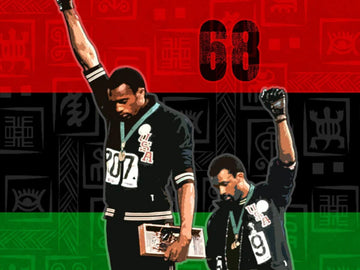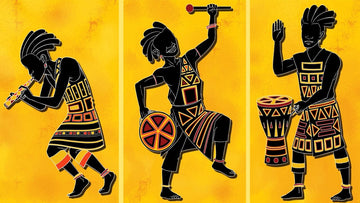
Every country, nation, and religion have its own legends and myths. Some stories have transcended geographical boundaries and are famous all over the world such as the story of Buddha and the Bodhi tree, the story of Jesus being nailed to the cross, or the fertility of Zeus (the way people get interested in this god's woven history is pretty bizarre). As one of the places with the oldest history of human settlement, the rest of the world has yet to get in touch with Africa's vast mythological treasures.
Nowadays, an increasing number of individuals are being allured to their pre-Christian ancestors' customs. Many modern African Americans, Afro-Caribbeans, South Americans, and other magical beings feel drawn to work with the Orishas, notably the Seven African Powers. The Seven African Powers are invoked to help with difficulties, spiritual growth, and connecting to one's inherent strength.
As spirit guides, everyone can invoke the Seven African Powers, and everyone has access to these Orishas for assistance. So, let's get to know them more!
Table of Contents
Origin of African Powers
Africa consists of many ethnic groups, each with a different culture and tradition. Therefore, it is very complicated to introduce African mythology.
Not to mention, in addition to the Egyptian civilization, which is preserved by ancient texts, other African peoples mostly transmit myths orally, and in some areas, monotheistic religions such as Islam and Christianity, God was influential early on. Therefore, in the regions of North Africa, East Africa, and South Africa, the mythological records of the peoples are scattered and not well organized.
However, in the West African coast and the Niger River Delta, West African mythology is still handed down and developed in a fertile way. Prominent are the gods of great peoples such as Fon, Igbo, Ashanti, Serer, and especially the massive system of gods (also known as orishas) of the Yoruba people, one of the biggest African tribes. The Orishas are a set of spirits that originated in Yorubaland, an area of Africa that includes Nigeria, Benin, and Togo.
The myths of those religions continued to spread to the Americas through the slave trade, and to this day, Afro Americans still tell each other about characters from their home continent, such as the deceitful king Anansi, the cunning rabbit Br'er Rabbit, etc.
Olodumare, the Yoruba creation deity, is the most important figure in the Yoruba religion. Furthermore, the Orishas are spirits (more akin to demi-gods or angels) that labor under the supervision of Olodumare. Olodumare created the Orishas and so has authority over them, as well as the Seven African Powers.
The Seven African Powers are made up of the seven most prominent Orishas: Elegua, Yemaya, Oshun, Chango, Obatala, Oya, and Ogun. These deities, who are frequently represented with their pictures linked together in a chain circling an image of the crucified Jesus, symbolize everything sacred and powerful in Santeria. The term "Seven African Powers" appears in several faiths, including Santeria, Hoodoo, Candomble, and Arara.
Eshu Elegbara
The way to mankind is opened and closed by Eshu Elegbara. He is the first Orisha to be formed and governs the crossroads that mankind travels through. This formidable orisha is the communicator between universes and the intersection guardian. In Haiti, he is known as Papa Legba, in Cuba as Elegua, and in Brazil as Exu. He might be the same spirit as Palo's Lucero.
Eshu is in charge of opening and closing roadways. He is summoned to eliminate impediments from your way as well as to keep hurdles and disasters from reaching you. He is a cunning trickster as well as a force for justice. Eshu is a seeker of the truth. Nothing can escape his notice. Eshu Elegbara traveled to the Western Hemisphere with enslaved believers, where he rose to prominence as one of the most important and highly worshipped spirits of African-Diaspora religions.
Eshu Elegbara acts as a go-between for humans and other spirits. When attempting to converse with other spirits, it is customary to first beg Legba to open the door. In African-Diaspora spiritual rites, he is the first spirit called. Legba unlocks the door for the other spirits to pass through.
This god's metaphorical color is black or red. The traditional picture of this deity is a clown in a red and black costume standing on street corners at life's turning points. Tobacco, alcohol, and rum are among the god's favorite emblems.
Ogun
Ogun is the god of war and blacksmith in Yoruba mythology, one of 14 children born from Yemoja's belly when she died. Ogun is a fearless warrior who defends his people and battles injustice.
Ogun is such an intelligent and creative Orishas to invent tools, weapons, and technology. His tools and labor were responsible for clearing the forest to establish cities, houses, and highways. He is the knife's tip, and as such, he is frequently misinterpreted. Ogun's nature allows him to wield the knife to either murder or rescue people during surgery.
Ogun lives throughout the world's outdoors and woodland locations. He's frequently spotted hunting with his best mates Eleggua and Ochosi. Ogun may be a devoted father who works constantly at his forge to create new inventions, or he can be a bloodthirsty warrior who swings machetes and decapitates his foes. He can also be a brilliant surgeon who eliminates tumors and saves lives.
Ogun's key emblems are iron, the dog, and the palm frond. They represent Ogun's function in transformation, mediation, and function. Ogun's major symbol is iron. In Yoruba territories and throughout the African diaspora, Ogun altars and Ceremonies exhibit and employ iron artifacts. The most commonly worshiped symbol of this god is the metal household items such as knives, scissors, saws, axes, etc.
Obatala
Obatala is the second son of the Supreme god Olorun and is the god credited with creating mankind. Obatala is considered a god of charity, justice, and the ability to heal. He is often depicted as a middle-aged man with gentle face, long hair, and simple white clothes. The symbols of the god are also white like water, milk, rice, white flowers, bananas, etc.
In the beginning, the world had only the vast sky ruled by Olorun, and the vast sea under the rule of the sea god Olokun, there was no life, only the gods alone. The world is too big and sad, Obatala came up intending to create the ground for life to flourish, and to give birth to a few more gods. Obatala asked Father Olorun's permission and asked for a prophecy from his eldest brother Orunmila. Orunmila instructed Obatala on the steps to create the ground.
Following Orunmila's instructions, Obatala released a golden chain from the sky, climbed down, and poured sand into the sea, creating the ground. He dropped a hen and a dove on the ground, so that they spread the sand everywhere, extending the land in all directions. Obatala set foot on the ground, where he called Ife, which would later become the ancient capital of the Yoruba. He planted a palm tree, and they proliferated into a palm grove. Then he asked Olorun for some light, and the old father created for him a whole Sun.
Being around animals and plants was also sad, Obatala decided to create humans from clay and asked Olorun to breathe life into them. However, due to his thirst, Obatala drank palm wine, causing him to get drunk and create several people with disabilities. Regretfully, he decided to become the guardian deity for the disabled. So Obatala lingered on the earth, becoming king of Ife, rejoicing among men. He taught them to work and rule the prosperous kingdom of Ife. Many years passed, he missed home and climbed up the golden chain to fly to the sky.
Yemayá
Olodumare, the greatest god, was Yemaya's father. Yemaya was thought to be the eldest daughter of Olodumare, the Creator of the Universe. Yemayá is the patron of the Ogun River (in Nigeria), however, she is not restricted to that body of water. Her devotees are free to worship Yemayá at any point where there is flowing water.
She is shown as a mermaid, capable of easily entering any body of water. Yemaya emerges in flowing garments of vivid blue and white, glistening with the light of the sun. These are her favorite colors because they remind her of the ocean's beautiful blue waves and seafoam. She is frequently shown wearing a robe with seven skirts representing the Seven Seas. She is also shown as a mermaid, with a gorgeous blue tail swimming over the sea with pearls and a starfish necklace. Her spiritual symbols include shells, pearls, and everything silvery.
Yemayá is regarded as the protective spirit of pregnancy. She keeps an eye on them and guards them, creating a safe working environment. She is also connected with amniotic fluid, which protects her infants from the harsh hazards of the world.
Oshun
Oshun is an important river deity among the Yoruba people, the goddess of love, fertility, beauty, and sexuality in Yoruba mythology, as well as the guardian goddess of the Oshun River. Goddess Oshun is depicted as a young, beautiful, and charming woman. Sometimes she even manifests as a mermaid. She has a penchant for sun-colored glitter, so in her paintings, Oshun often wears yellow dresses and wears a lot of jewelry. Not only that, everything that is golden in life such as orange, bread, honey, amber, etc. is her symbol.
She is said to be one of the children of the Supreme god Olorun who was sent to the earth to protect humanity. Oshun married the fire god Shango and became the most beloved wife because of her beauty, popularity, and excellent cooking skills. This makes Oba, a river nymph and another wife of Shango, jealous. Legend has it that the jealousy between the two goddesses is the cause of the rivers to appear violent whirlpools.
Except for the jealousy scenes with Shango's other two wives, second-grandmother Oshun is also a very good god to humans. When the Earth was still unspoiled, newly created by Obatala, the creature was still unable to thrive, the gods had to rely on Oshun. She created freshwater streams that covered the world, helping plants and animals to thrive. Legend has it that she turned into a peacock herself, flew to the supreme god Olodumare to ask him to relieve the drought and bring rain back to people. Africans think that flowing water means she is dancing, the sound of water murmuring is her voice, dipping sand in the river to find gold is finding the goddess Oshun to ask for some jewelry. Therefore, she is also considered the goddess of life and fertility.
However, being the one who gives life, she can also take it away. Once she was angry, Oshun would flood the crops, or cause the river to dry up, causing drought. That's why people have to pray to her so that she can calm down, not cause natural disasters, and help her crops get bountiful.
Shango
Shango can be said to be the most scandalous god in Yoruba mythology, the male thunder god, the son of Agayu and Yemoja. Shango has three wives, the eldest Oshun, the second Obba, and the third Oya. Each woman lives in a separate house, Shango visits them every day and the ladies always try to compete for favors very intensely.
Shango has 6 eyes, sometimes described as having 3 heads, in his hands, he holds a pair of axes that shoot thunder. The closest human image of this god is a man-made of iron (not that close to human!) with an ax weapon and flaming eyes in a red cloak. He often thunders down the wicked and protects the weak. This is also the god who symbolizes music, parties, and indulgence in parties. The colors representing this god are red and white, accompanied by symbols such as spicy food, strong alcohol, metal. Wild animals such as tigers, leopards, crocodiles are also considered mascots of this god
Shango's children are born with a cross on their tongue, they will grow up to be very healthy, wise, and proud, provided they do not cut their hair until the age of 12, otherwise, all their powers will disappear. They are called the Bamboche I - messengers of Shango.
Another legend says that Shango was not the son of Yemoja, but was originally a powerful and violent king of the Oyo Empire. It is rumored that Shango says he screams fire. However, he was not pleased when the people praised his two closest generals, Timi and Goenka. Unable to bear it, Shango plotted to make Timi and Gbonka confront each other in a fierce battle. Gbonka won the battle beheading Timi, after which Shango burned Gbonka alive. But Gbonka did not die, bravely stepped out of the fire, threatening Shango to run into the forest and commit suicide under the ayan tree. That night thunder filled the sky and destroyed all the houses of Shango's enemies. Fearful, the people built a temple to Shango, worshiping him as the God of Thunder.
Oya
Oya, is the goddess of the storm, the guardian of the Oya River (ie the Niger River), sometimes also the goddess guarding the gate to the dead. Oya is Shango's third wife, and also the most favored concubine by her husband. A couple like a couple Bonnie & Clyde always go together to guide the people, the husband calls the thunder, the wife calls the stormy wind, together with sweeping away all roads.

Goddess: Oya (Yoruba) by quirkybird is licensed under CC BY- 2.0
Oya is also the deity representing female fertility, magic, divination. She is also considered the goddess of the mystical world, of death, and of ancestors. Her symbols are often fruits such as plums, purple grapes, star fruit, symbolizing the secret of childbirth and the beauty of a woman. She is also the protector of livestock with all kinds of wealth such as cattle, goats, sheep.
Oya was originally an antelope turned elf, able to shed her animal skin and transform into a beautiful girl. Every 5 days, she transforms into a beautiful herding girl wearing 9 copper bracelets and goes to the market to buy things, there she meets Shango, making him fall in love. Shango chases after Oya, but she secretly transforms into an antelope and escapes. The next day Shango hid in the forest, saw Oya shed the animal skin and turn into a human, so he rushed to hide the antelope skin. Oya can no longer turn into an antelope and agrees to be Shango's wife.
Another story tells the ending that, shortly after she became the god's wife, Oya became pregnant with twins, so she was jealous of Shango's two wives (twin children are extremely worshiped and respected by Africans). They showed her where Shango hid the antelope skin, and she turned back into an antelope and ran away.
How to Invoke the Seven African Powers
Generally, you can call on the energy of African Powers anytime you need help overcoming problems and growing spiritually. You may also channel their energy to motivate you in many aspects of your life. These wonderful energies are available to everyone.
When summoning 1-2 souls separately, these Orishas may be at odds with one another. However, when summoned in unison, these seven Orishas will collaborate to assist the summoner. There are several ways to summon African Powers, including prayer, the use of candles, soap, and oil.

The Seven African Powers Candle by playability_de is licensed under CC BY-ND 2.0
Candles frequently show all seven saints at the same time because it generates a pleasant and uniting aura. Light one candle every day for 7 days to summon all 7 Orishas. When you light the candle and pray, you are summoning the energy of the Orishas and encompassing all of your surroundings to bring fortune and safety.
You may also utilize oils, incense, and soaps made with the energy of the 7 African Powers to bless any ceremony or spell you perform. Anoint your locks, purses, lights, automobiles, and bodies with the oil to beg for their blessings and protection. While praying, lighting oil is like making a tribute to these spirits. To begin your day, wash using African Powers soap to eliminate any negative energy.
----------------------------
Hope you have acquired some useful knowledge about the seven powers of Africa. The gods, regardless of religion and country, all came from the thoughts, wishes, and aspirations of people as well as helping them to explain the mysterious natural phenomena at that time.
Experiencing the loss of slavery, African mythology has lost many of its precious meanings. Currently, there are many diverse rituals in the worship of these symbols, the meaning of the rituals is also distorted. If you intend to summon and engage with the Seven African Powers for healing, plenty, fertility, and so on, you should do it with regard and respect. Appreciating ancestral values is a premise for any nation to progress further in development to the most comprehensive.




